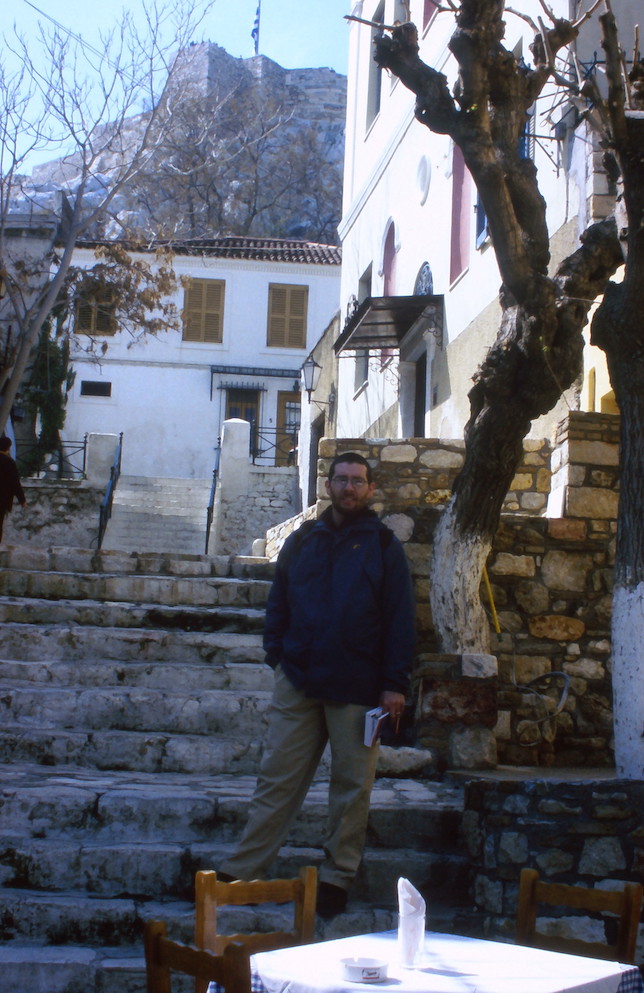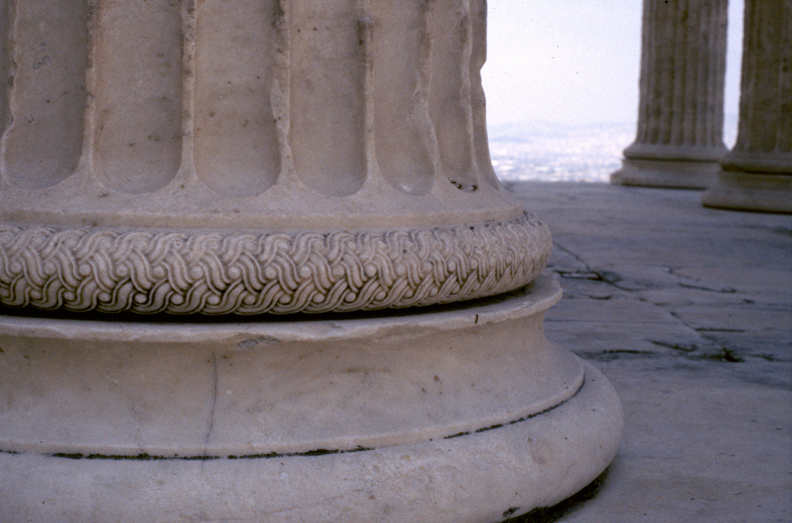3/29/98: Visited the Acropolis, and a walk through Monastraki neighborhood. Found a music shop that sells bouzouki (Greek mandolins). After the V’s get home in the evening, George took me to his office to try and get our computer to work on the phone lines there. To no avail! Long distance call to CompuServe. No help, in fact the rep was rude and when I asked his name he hung up on me!
3/29/23: The brief diary entry suggests I was writing almost immediately after a frustrating call with tech support trying to get my laptop modem to function correctly. So much so that I didn’t relate any details about a fantastic visit to the Acropolis and Mars Hill. This marked, essentially, the first stop on our to several places significant to Biblical history, so I really ought to have jotted more reflections on the occasion.
It was the Areopagus of Mars Hill, where Paul addressed the Athenians, described in Acts 17:16-24 (text below). Along with the snapshots of our trip, here is a link to a google streetview of the approximate location Paul articulated his speech to the Athenians. The plaque that is visible in the streetview contains the text of Paul’s sermon.
One thing that is interesting about this sermon, is that Paul uses a contextual apologetic method that draws upon the Greek philosophers and mythology with which the Athenians would have been familiar. In verse 28, he quotes both Epimenides and Aratas. The two different quotes may come from Greek philosophers, yet we can see how they align with Scripture. Paul goes on to demonstrate to the Athenians, from their own philosophy, that the God of the Bible is the one true god, and the resurrected Jesus Christ is He whom they seek to know in the worship of “the unknown god” (verse 23). Some walked away thinking Paul was crazy, some were moved and needed to hear more, and some “joined him and believe,” becoming Christians. Today the Church around the world still needs to contextualize the Gospel with same earnest and winsome heart that Paul and the early Christians exhibited. The Greek and Roman world was transformed, and our world today can be transformed too.
Acts 17:16-34 (ESV translation)
16 Now while Paul was waiting for them at Athens, his spirit was provoked within him as he saw that the city was full of idols. 17 So he reasoned in the synagogue with the Jews and the devout persons, and in the marketplace every day with those who happened to be there. 18 Some of the Epicurean and Stoic philosophers also conversed with him. And some said, “What does this babbler wish to say?” Others said, “He seems to be a preacher of foreign divinities”—because he was preaching Jesus and the resurrection. 19 And they took him and brought him to the Areopagus, saying, “May we know what this new teaching is that you are presenting? 20 For you bring some strange things to our ears. We wish to know therefore what these things mean.” 21 Now all the Athenians and the foreigners who lived there would spend their time in nothing except telling or hearing something new.
22 So Paul, standing in the midst of the Areopagus, said: “Men of Athens, I perceive that in every way you are very religious. 23 For as I passed along and observed the objects of your worship, I found also an altar with this inscription: To the unknown god.’ What therefore you worship as unknown, this I proclaim to you. 24 The God who made the world and everything in it, being Lord of heaven and earth, does not live in temples made by man, 25 nor is he served by human hands, as though he needed anything, since he himself gives to all mankind life and breath and everything. 26 And he made from one man every nation of mankind to live on all the face of the earth, having determined allotted periods and the boundaries of their dwelling place, 27 that they should seek God, and perhaps feel their way toward him and find him. Yet he is actually not far from each one of us, 28 for
“‘In him we live and move and have our being,’1
as even some of your own poets have said,
“‘For we are indeed his offspring.’2
29 Being then God’s offspring, we ought not to think that the divine being is like gold or silver or stone, an image formed by the art and imagination of man. 30 The times of ignorance God overlooked, but now he commands all people everywhere to repent, 31 because he has fixed a day on which he will judge the world in righteousness by a man whom he has appointed; and of this he has given assurance to all by raising him from the dead.”
32 Now when they heard of the resurrection of the dead, some mocked. But others said, “We will hear you again about this.” 33 So Paul went out from their midst. 34 But some men joined him and believed, among whom also were Dionysius the Areopagite and a woman named Damaris and others with them.
1 Possibly a quote from the poem “Cretica,” by Epimenides of Crete (6th or 7th century BC).
2 From the poem “Phainomena” by the Greek poet Aratus (around 315 BC).






1 thought on “Mars Hill and Contextual Apologetics”
Comments are closed.